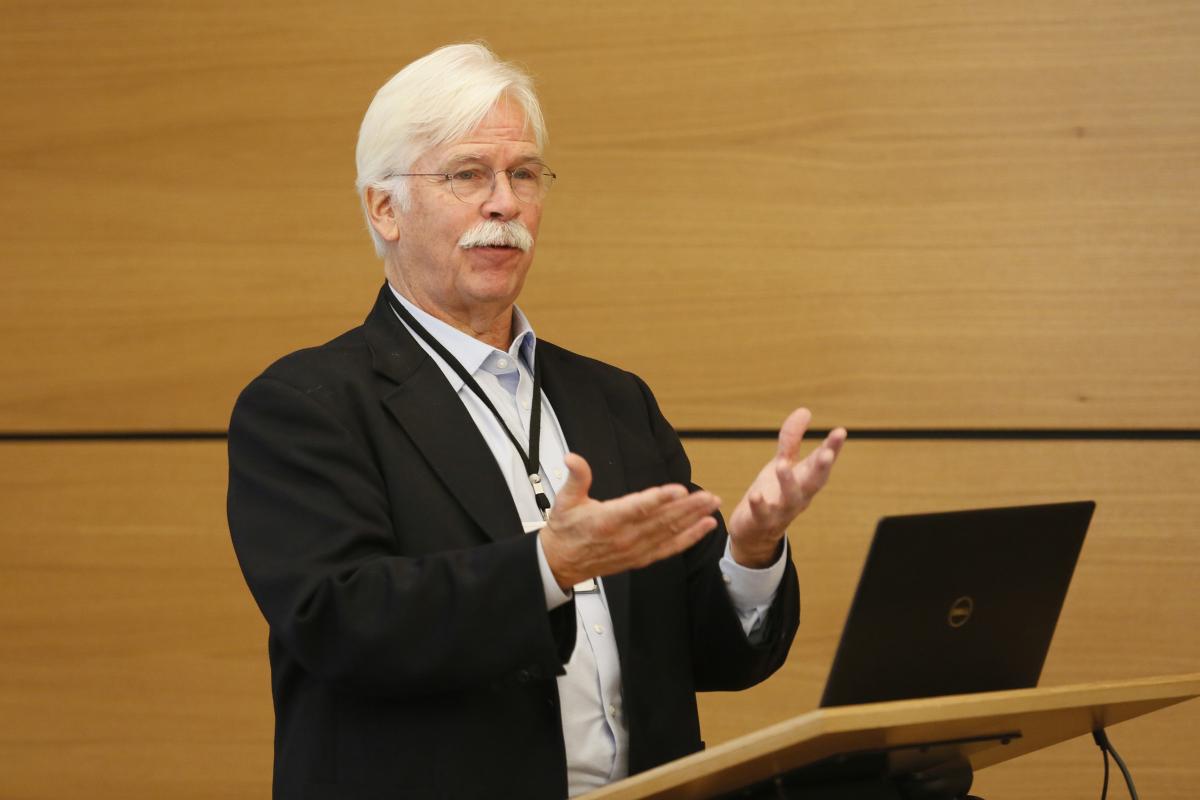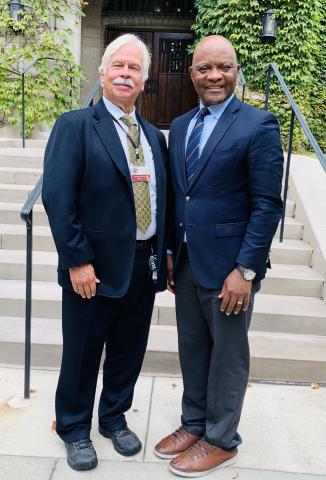
In Brief
- Sherer's career was forged in the darkest days of the AIDS crisis in Chicago.
- The crisis strengthened his commitment to human rights as a vital lens for medical practice.
- Today, he applies this perspective to AIDS-related interventions and trainings worldwide.
- His popular Health and Human Rights course is being offered this Winter quarter.
Pozen faculty board member Renslow Sherer has trained health care workers all over the world in the prevention and treatment of HIV/AIDs, run clinical trials, helped shape local and federal policies, and published research in the most prestigious medical journals.
“But whatever else I am,” says Sherer, “my core identity comes from the work I started with almost 50 years ago, at Cook County Hospital, and from working there at the peak of the AIDS crisis.”
Sherer came to Cook County—the only public hospital in Chicago—as a medical resident in 1977, drawn to the hospital’s commitment to serving “anyone, no wallet biopsy required.” He was also impressed by the staff’s history of political action, including strikes by the residents’ union demanding improved conditions for patients.
I find that students really appreciate encountering and thinking through the Universal Declaration of Human Rights, and the basic idea of a right to health. It gives them tools to think about the work they’re going to do, and the contribution they’re going to make.
In 1982, his residency completed, Sherer stayed on as an attending physician in general medicine. Two months into the job, a patient came in complaining that, though he was used to going on six-mile jogs, now he was running out of breath after just two miles. This patient turned out to be one of the very first— perhaps the first—known cases of HIV/AIDS in Chicago.
Working with Ron Sable, another Cook County doctor, Sherer started the Sable/Sherer Clinic at Cook County in 1983 (in 1998, it became the Ruth M. Rothstein CORE Center). They didn’t put “HIV” or “AIDS” in the name of the clinic because the disease was too stigmatized.
“We were a place for people who were scared about their symptoms, scared about what they were hearing about this new disease, scared because they didn’t know what was happening or what to believe,” says Sherer. “And because we were at Cook County, we were the providers of last resort for Chicagoans with HIV, especially Chicagoans of color.” Through the mid-Nineties, it is estimated that one-third of Chicagoans with HIV/AIDS were treated at the Sable/Sherer clinic.
HUMAN RIGHTS AS 'THE NECESSARY LENS'
The more Sherer learned about HIV/AIDS, the more the human rights lens for medicine made sense to him. At an international conference of doctors working on the frontlines of the crisis, Sherer attended a talk by Jonathan Mann, the founder of the World Health Organization’s AIDS program and a pioneering figure in the integration of health and human rights. “Mann argued that the human rights lens was the best lens—the necessary lens—for dealing with HIV/AIDS. And that’s stuck with me ever since. Keeping human rights principles in mind makes you a better doctor.”
After advances in pharmaceutical treatment blunted the worst of the crisis, Sherer began turning his attention to how the lessons he’d learned at his clinic could be adapted for use around the world. Since then, he has worked on HIV/AIDS prevention and stigma reduction programs around the world, centrally in Africa and China.
Sherer joined the UChicago Department of Medicine in 2003 as a Clinical Associate in the Section of Infectious Diseases and Global Health, and quickly made connections with the university human rights community. Susan Gzesh, then the head of the Human Rights Program (which eventually became the Pozen Center), invited Sherer to start co-teaching a Health and Human Rights course with Evan Lyon, a renowned specialist in the interplay of health and human rights. For the last 15 years, Sherer, now a Professor of Medicine, has been teaching the popular course himself. It attracts between 40 and 60 undergraduates each year, many of them pre-med, many of them economists with an interest in health policy.
“I find that students really appreciate encountering and thinking through the Universal Declaration of Human Rights, and the basic idea of a right to health,” Sherer says. “It gives them tools to think about the work they’re going to do, and the contribution they’re going to make.”
Sherer’s presence on the faculty board has created a conduit between the Pozen Center and major figures in the field of health and human rights, like John Nkengasong, the Biden administration’s Global AIDS coordinator; his predecessor, Deborah Birx; Paul Farmer of Partners in Health; and the renowned Indian lawyer and right to health activist Anand Grover. On-campus events with these practitioners have exposed Pozen students to cutting-edge perspectives on the roles that human rights can take in addressing pressing problems.
“We’re coming up on an era where all the questions I grappled with through the AIDS crisis are going to take on an acute relevance here in America,” says Sherer. “We’re facing, potentially, attacks on sanctuary cities, which impacts the right to health of immigrants. We’re facing cuts in Medicare and Medicaid, which will impact the right to health of the poor and elderly. We have heinous laws restricting abortion that codify obstetric malpractice and undermine the right to health of women, and we have dreadful assaults on transgender individuals and their families and caregivers. The human rights lens has so much to offer on all these fronts, so I’m grateful for the opportunity to pass it on to a new generation of students.”

